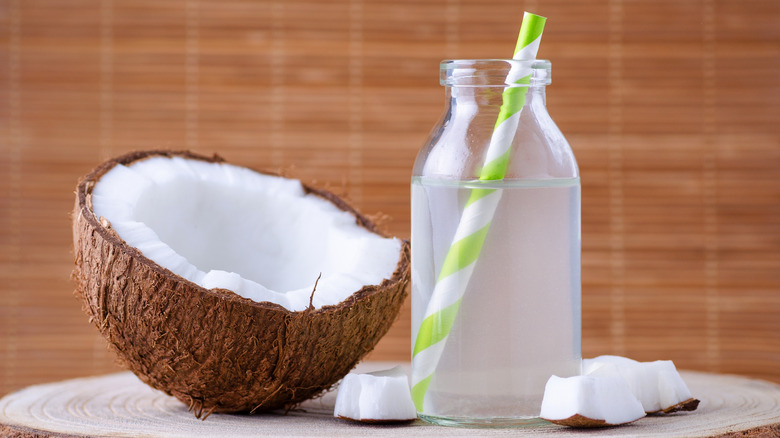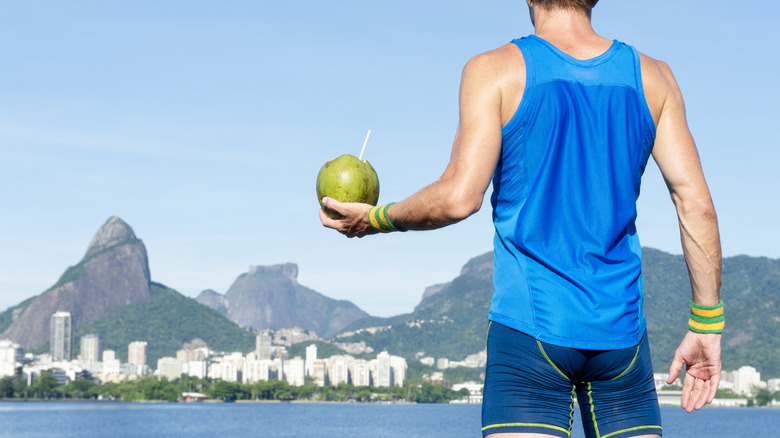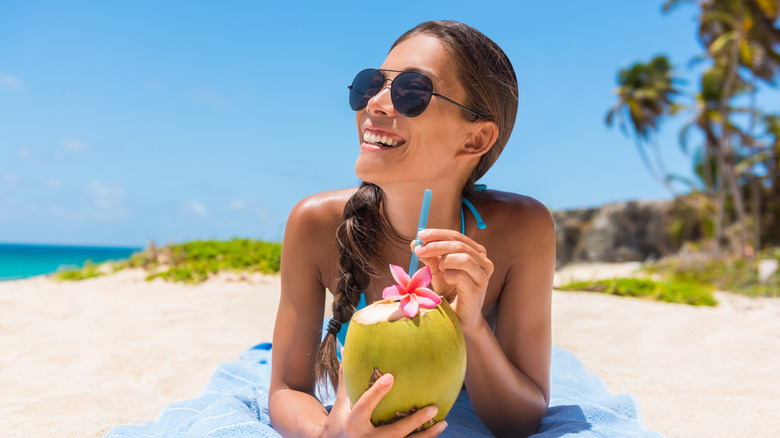Is Coconut Water Actually Good For You?
Coconut water has been touted as a healthy alternative to sports drinks. What makes it stand out is its high nutritional value — one cup has fewer than 50 calories and large doses of potassium, magnesium, sodium, and other electrolytes (per My Food Data). Plus, it tends to be lower in sugar than soda and sports beverages (via Forbes).
Some athletes swear by coconut water for faster recovery and increased energy. "We sweat so much, and we lose a lot [of water]. I want things that are natural, and so I tried coconut water a few years ago because it is more natural than Gatorade," hockey winger Jussi Jokinen told ESPN. Professional hockey players Malcolm Subban and Brooks Orpik drink this beverage daily or every other day, too. The general belief is that coconut water helps maintain a healthy electrolyte balance and increases hydration.
However, it's best to take these claims with a grain of salt. As of today, there isn't enough evidence to support the purported health benefits of coconut water, notes the American Council on Exercise. Some brands have actually faced class-action lawsuits over false marketing claims (via Business Insider). Is coconut water really any better than plain water?
Coconut water keeps you hydrated, but it's not the best choice for athletes
This beverage is made from the clear liquid found in young coconuts. Depending on the brand, one cup provides around 13% of the recommended daily potassium intake, 14% of the recommended daily amount of magnesium, and 15% of the recommended dietary allowance for manganese (via My Food Data). You'll also get hefty doses of calcium, phosphorus, vitamin C, and riboflavin. Magnesium, potassium, sodium, and other minerals in coconut water can help replace the fluids and electrolytes lost in sweat, explains WebMD. The problem with this drink is that it has too much potassium and too little sodium to benefit athletes after a strenuous workout or sports event. Plus, it's too low in carbs to replenish your glycogen stores following intense training.
"Whether you choose a sports drink, coconut water, or plain water, they all work to keep your body hydrated. The challenge is when you exercise strenuously for more than 3 hours in the heat and lose lots of body fluids, you need easily absorbed carbs for quick energy and to replace lost electrolytes like sodium and potassium," says sports nutritionist Nancy Clark (via WebMD). Eating a banana, dried fruits, or other foods rich in fast-digesting carbs after exercise is better than sipping on coconut water, according to Clark. This beverage can help with rehydration, but you have to drink a lot of it to reap the benefits.
Experts say that coconut water is overrated
Research shows that coconut water may lower blood pressure and blood sugar levels, prevent kidney stones, and improve blood lipids (per Healthline). However, we don't really know how it benefits human health because most studies have been conducted on animals. For example, a 2006 study published in the Journal of Medicinal Food found that rats fed with coconut water while on a high-cholesterol diet experienced reductions in blood lipids. These findings may not apply to humans, though.
That said, the American Academy of Nutrition and Dietetics suggests coconut water is overrated. As the researchers note, this beverage doesn't seem to be any better for hydration than plain water. Plus, it can contain added sugar and empty calories, and its nutritional value may vary from one brand to another, according to registered dietitian Marjorie Nolan Cohn.
Nolan Cohn also says that coconut water has negligible effects on heart health and metabolism. Despite its high potassium levels, it's unlikely to prevent heart disease or stroke. Potassium-rich foods are a better choice, as they contain several other nutrients that keep your heart functioning at its peak. Dried fruits, potatoes, bananas, yogurt, beans, avocado, and salmon are all excellent sources of potassium (per the Harvard School of Public Health). While coconut water seems to be healthier than fruit juice, there is nothing magical about it. If you decide to give it a try, choose a brand with no added sugar or other fillers.



